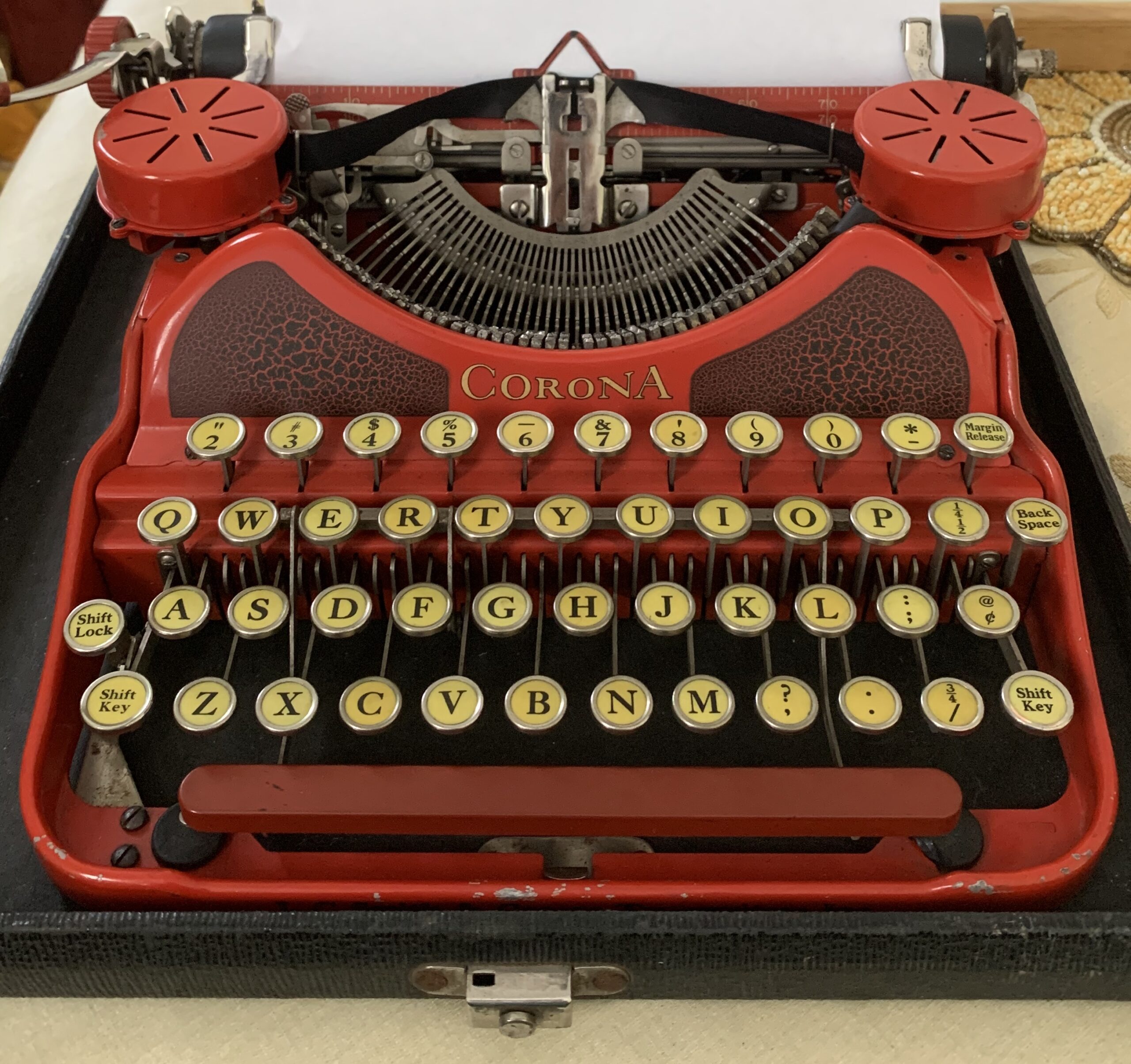“The only admonition that I give them is to write a poem that is uplifting, something that will make the recipient smile or think longer or differently about their three words.”
This essay is the runner-up in the 2020 Bechtel Prize Contest for an innovative classroom writing activity.
It started out with just one, as collections do. I purchased the vintage Remington 5 typewriter in the thrift store because it was aesthetically pleasing. It was a work of art. Substantial in its build. Significant to the touch. The sound of keys on paper was satisfying. The ding at the end of a line, a sentinel alert to diminishing space. Slower and more deliberate. A pace missing in most classrooms today. But then again, our classroom is not like most classrooms. It is set up like a coffee house; hot tea is served daily. Ambient lighting sets the mood. High-tops, booths, long tops and low tops provide seating options. Quotes are written on the walls in permanent marker and added to whenever a student says something “wall-worthy.” Our room is referred to as the Dragonfly Café and my writers are the dragonfly café poets.
The Remington found its home in our cafe. I set it on an empty table. Cool and quiet it sat until a student approached it and hesitantly touched the keys. She ran her fingers over them.
“Oh, can I try this?”
Just what I had been waiting for, the desire to try.
I gathered the other students around the typewriter. Showed them how to roll the paper on to the roll bar and set them loose to try it out, to discover the heft, the sounds, the satisfaction.
“This is so cool, Ms. Fox.”
“I know, right? I think it was Hemingway’s laptop.”
“Really?”
“No, I’m just kidding.”
Everyone wanted a turn. I knew then that one typewriter would never be enough for my writers. The quest began, and before long, we had seven vintage typewriters. Each one individual and beautiful. Each one appealing to a different student. Each one from the past that many consider obsolete and insignificant. But in the Dragonfly Café we are used to “taking the road less traveled by.” We write daily with black Ticonderoga pencils in our steno pads and at times we go to the woods to write. Some days, we find poetry hiding in the blue between when we gaze up at the clouds. Every day we read and/or write poetry for the pure pleasure of the words and for the opportunity to think about the world without worry of having a right answer.
Curating Words

Plunking out poems was all well and good, but we wanted to do more than simply type for each other. There had to be a way to share our TYPE of poetry with others. Our unique curriculum is based on our community. I decided that we needed to go public with our typewriters, our words, and our carbon paper.
Preparation is the key to every successful endeavor. Since poems are made with words, we needed a collection of them. The first thing we did was read the books The Word Collector and The Boy Who Loved Words. Each poet created their own word collection notebook, the small kind that slips easily into a back pocket. They decided on their own headings like Beautiful Words, Distinctive Verbs, Words I Don’t Like, Travel Words, Lake Words, Words from my Grandma, Sound Words and Color Words. What a delight to hear kids excitedly sharing their collections.
“I love that one. I am going to add that one to my collection.” The word was susurration.
“I cannot stand the word pulchritude. Why such an ugly word for pretty?”
“I know, right?”
A former student has sent us the Bonus Word of the Week for the past 15 years. Many of his words like petrichor, rampike, and philomathic went on their lists. Although Owen is no longer in our class physically, he is still a vital part of it. If he misses a week, the class gets concerned. The love of words connect us.
Our daily writing practice includes three-word starters drawn from the word jar and fractured poems where a line from one poem starts their poem. After a few original lines, another line from another poem is added and at least one more fractured line is added. These exercises are implemented to develop spontaneity and creative thinking.
People, Places, and Poets

Our debut was at a local bookstore during a celebration of poetry for National Poetry Month. We then received numerous invitations. We are now the in-house poets at the Ringling Art Museum writing ekphrasis at evening events. The Dragonfly Café typewriter poets are the poets-in-residence at the Marriott Art Ovation Hotel where we serve a seven-day residency twice a year in the lobby studio writing poems for hotel guests. Participation is on a volunteer basis and we always have every spot filled. No one gets turned away. The poets are invited to a variety of events throughout the year both in Sarasota and Manatee counties, proving that poetry cannot be contained by county lines.
What does typewriter poetry entail? How do you begin? After making a connection with a guest who pulls three words from the jar, the poets:
- find a connecting thread between the three words
- establish a theme or message
- observe the surroundings of the event
- combine bits of overheard conversation,
- draw on their own experiences
Then they begin to type. They head the paper with the three words and the recipient’s name and in a matter of minutes, it all coalesces into a raw poem. We call them raw since there is no time to edit or fix the skipped and staggered letters of the old unpredictable typewriters.
Of course, each poet does have their own process. In addition to the above, Hannah W. looks into the face of the guest and infers the poem that is “written on their face.”
Annabelle, who delves into the pursuit of philosophy, inserts layered thoughts into her poems.
Paige determined that composing on the typewriter made her more deliberate with her thoughts.
The only admonition that I give them is to write a poem that is uplifting, something that will make the recipient smile or think longer or differently about their three words. We have received affirmation of the power of their poetry. One evening, Hector wrote a poem of love and time. The man turned to his wife and with tears in his eyes said, “This is why I have loved you for 35 years.” They were at the hotel celebrating their 35th anniversary. Hector was surprised at the power of his poem. How powerful it was for him to witness the impact of his words.
Hannah wrote of a grandmother which made the women receiving the poem declare that she was going to call her grandmother, whom she hadn’t talked to in while, when she got home. I smile at the thought of the grandmother getting an unexpected call.
One of my shy girls was nearly paralyzed at the thought of reading her poem, but she didn’t have an option, she had to read. The woman praised her words and her voice. Everything changed for that little girl; she was empowered and self-assured after that.
Louise, a hotel guest, visited the poets on consecutive nights. She planned to frame her poems and create a gallery wall of typewritten poems in her home.
It Doesn’t Stop Here
The Dragonfly Café poets are comfortable meeting people, sharing their words, and being recognized throughout the community. They are skilled in eye-to-eye contact, shaking hands, and public speaking. They create poems of depth and relevance. They use carbon paper, so they have a copy of each poem for their portfolios. Some poets’ portfolios bulge with the evidence of their involvement in the community.
Still, our reach is limited. We are in the moment, present with our guests in the social art of creating, giving, and receiving. Our next step is to add another dimension and create a poetry podcast. Poetry is meant to be heard, which is why we always read a poem before we gift it. We have quarterly café nights featuring the best poetry of the quarter and open mic for returning poets, parents, and patrons who now follow the typewriter poets. With a poetry podcast, we could spread the words of poetry in a conversation between my poets about poets and poetry. In the moment of listening, we can provide a surprise, a line that lingers in the silence that follows the spoken word. It’s an opening of the door, welcoming others into our poetry life.
Joanna Fox teaches creative writing as the literary art at Booker Middle School Visual and Performing Arts Magnet School in Sarasota, FL. She is celebrating her 20th anniversary of teaching this year. In that time both she and her students have received many awards for writing. Nine of her students have been honored at the Library of Congress. Her awards include the Penguin Random House Maya Angelou Poetry Teacher Award, the University of South Florida Dean of the College of Education Lifetime Achievement Award and the International River of Words Teacher of the Year. Joanna and her students were featured on a PBS Emmy Award winning show and on WUSF NPR.




2 responses to “Three Words Away a Poem Awaits”
I love the idea of your classroom as a cafe. I wish I had thought of it. I teach at a school where social studies is taught in Academic Clubs that replicate the era the students are studying and each student assumes the role of a historic character. This model would work really well. Coincidentally, we are the Dragons. We could then be the Dragon Cafe! This year, I added two manual typewriters to my tiny classroom and the students loved it. It allowed them to make mistakes and not worry about the final product being “perfect.”
Amy,
What a great way to teach social studies. With so many museums offering their collections on line, you might augment your studies with relevant arts exhibits.
Joanna